- Home
- Donald Hamilton
The Damagers Page 8
The Damagers Read online
Page 8
The trouble with performing a rescue off the stern of Lorelei III was that the raised aft deck made it a long haul; not only that, but there was no boarding gate in the stern rail. Our burden had to be hoisted four or five feet from the water just to reach deck level, and then an extra thirty inches to clear the rail, before he could be swung inboard. I got myself aboard when he neared the top. Lori cranked like hell, and I pulled and hauled and kind of rolled him over the rail toward me, and suddenly he was swinging free at the end of the wire halyard, above the teak deck.
“Okay, lower away,” I called.
Lori eased him down. I caught him, and spread him out neatly on the well-lighted aft deck, and took the opportunity to run my hands over him. No weapons; but something made me go over him again. Lori came to look down at us, ducking as spray sluiced across the boat.
She said, “Well, I’d better get us back on course before she rolls the sticks out of her… What’s the matter?”
I said crudely, “Shit, this son of a bitch is dead.”
“But he can’t be! I heard him… CPR?”
I said, “He wasn’t in the water long enough to need resuscitation. That’s not his problem; the explosion seems to’ve driven a big splinter of plywood into his groin like a dagger. He just bled to death while we were hauling him aboard.”
We were silent for a moment while the wind howled around us and spray drove past us. Maybe Lori was expressing respect for the dead; I was just thinking selfishly that it had been a hell of a lot of hard work wasted. I drew a long breath.
“Okay, you put the show back on the road,” I said. “You might as well take it in the deckhouse where it’s dry. I’ve got to see if he’s got any ID on him before I dump him.”
“Matt, shouldn’t we…?” Lori checked herself. It was obvious that she would have preferred to bring the body ashore for a decent burial. I didn’t speak, letting her work out for herself the endless complications that would follow. She said quickly, “Forget it. But I’d better stay at this wheel until you’re finished. If I’m at the forward station, you could be washed overboard and I’d never know it.”
Kneeling beside the dead man, I felt Lorelei III begin to move, returning to course and resuming her southwesterly progress, but at reduced speed. The floodlight on the mizzen mast, shining down, showed me a dark aquiline face; it was not one of those I’d studied in Mac’s office. The driver’s license was made out to Joseph Abdul Arram, of New York City, born thirty-four years ago, height five-eight, weight one seventy-five. He felt heavier than that when I levered him over the stern rail and let him splash into the sea. Then I had to climb down the stern ladder far enough to swing the lower section back up into its stored position. Lori helped me over the rail.
“Everything is under control, skipper,” she shouted. “If you’re through here, let’s get in out of the weather.”
Lorelei III was working slowly to windward under power. Even at this reduced speed she was taking a lot of spray; and Mr. Aram’s blood was washing away fast. A wave exploded forward and doused us as we made our way to the deckhouse.
I closed the sliding door behind us. Lori went to the wheel and checked the compass, loran, and radar, set the autopilot, killed the glaring deck lights, and turned on the running lights. After the uproar outside, the deckhouse seemed very quiet and peaceful. I reached up to switch on one of the cabin lights overhead. Lori turned at the wheel, squeezing her wet hair back with both hands, although there wasn’t much of it to squeeze. Her drenched T-shirt and shorts were plastered to her small body, and a dark wet area was forming on the carpet around her bare feet. Suddenly, she was hugging herself and shivering uncontrollably.
“C-cold,” she said. “S-should have p-put on oilskins. Somehow n-never think of it, s-s-steering from in here where it’s so nice and dry… Oh, Jesus! D-don’t look at me. Some k-k-kind of idiot reaction…”
She turned away, hunched over the steering wheel, her shoulders shaking. I hesitated, but I’d kept my hands to myself long enough; I went over and turned her around, and she threw her arms around me and clung to me desperately.
She gasped, “S-scared, I was so d-d-damned scared…”
“Who wasn’t? Join the Cowards’ Club, Miss Fancher.”
“You didn’t look very scared, damn you!” she said angrily.
I said, “I’ve had a lot of practice at putting on my hero act.”
“Well, you sure fooled me!”
“And you fooled me,” I said. “I was afraid I had some kind of a kooky superwoman on board. It’s nice to know we’re both perfectly normal.”
She giggled and, after a moment, looked up at me, her lips slightly parted in her sea-wet face. The invitation was obvious and could not be refused, not that I had any desire to refuse it. It was quite a satisfactory kiss, as kisses go. I was glad to discover that she knew where the noses went; she wasn’t quite as young and inexperienced as she sometimes looked.
After an interesting exploratory interval, she said, a little breathlessly, “Well, it t-took you long enough to g-get around to that!”
“You wanted to be unpromiscuous, remember?”
She laughed. “You shouldn’t believe everything a g-girl t-t-tells you.” She hesitated, and went on. “There’s nothing on the radar, and we’re not moving very fast; the boat can take care of herself for a little while. Let’s g-get us the hell out of these wet c-clothes and into a dry b-b-bed.”
There was some stiffness in her attitude. Clearly she wasn’t used to offering herself to strange men, and wasn’t certain she was doing it right or, in spite of the kiss, that I even wanted her; but after dealing with death there’s almost always the impulse to reaffirm life in the most direct way possible. However, I’d come to like and respect this girl, and I hesitated to take advantage of her impulses in this, to her, unfamiliar situation.
I said, “Just for the record, I’m pretty old for you, and I’m kind of a mean guy.”
She laughed again, relaxed now, knowing that she hadn’t misread me or approached me wrong. “I love old, mean guys. Come on, I’m freezing, Matt. I’ll catch pneumonia if you make me stand here dripping while you struggle with your lousy c-c-conscience. You know it’s g-going to lose, anyway.”
It did. It’s really not much of a conscience.
9
We raised the misty lights of the New Jersey coast just before dawn. Instinctively, I checked the depth-sounder— when you suddenly see indications of land ahead, you want to reassure yourself that it isn’t sneaking up on you from below, also. But we were still a good many miles offshore, and the instrument, betraying its origin, showed a depth of some fifty European meters, which agreed with the charted soundings, at our loran position, of around twenty-five nautical fathoms, which my conventional brain managed to translate to about a hundred and fifty good, old-fashioned U.S. feet. The standardization of seagoing units of measurement leaves something to be desired. Anyway, with a two-meter, or one-fathom, or six-foot draft—take your pick—we weren’t in any immediate danger of running aground.
I leaned over to call into the cabin, “Land ho!”
Lori came up, wiping her hands on a rag. She was wearing ratty blue jeans that had recorded on them a long history of boat painting and repairs. For a change, the pants were neither too large nor too small, but she had on a white shirt she must have inherited from King Kong, that had also received its share of indelible boat-yard stains. She looked at the dim chain of lights off the starboard bow. It wasn’t brightening very fast since, on our southwesterly course, we were closing with the land only gradually. She checked the loran, and the chart, and nodded.
“We’re a little behind our original schedule, but we should make it to Cape May with plenty of daylight to spare,” she said.
Under normal circumstances I might have made some kind of a crude joke about the breathless sexual activities that had contributed to the delay; but she was a very serious little girl this morning, and instinct warned me that it was n
ot something she cared to be kidded about.
“How are you coming with the repairs?” I asked instead.
Her conscience hadn’t let her spend too much time in my arms afterward; she’d felt compelled to get up to the bridge to make sure we weren’t ramming anything and nothing was ramming us. When we were dressed again, in dry clothes, we’d checked the boat out thoroughly before bringing her back up to cruising speed. We’d found four bullet holes in the hull, plus an insignificant groove in the mizzenmast; not many hits considering the number of shots that had been fired at us. None of the bullets had hit any tanks, machinery, or instruments. Lori had taken over as damage control officer while I functioned, temporarily, as helmsman and navigator.
Now she reported: “I’ve patched all the interior holes that showed. As soon as we have a little more light, I’ll mix up a batch of gelcoat and fill the outside ones. I don’t think we need to inflate and launch the dinghy; I can work hanging over the side, if you’ll hold my ankles.”
I said, “I’ll be more than happy to hold your pretty ankles, ma’am. Call on me anytime.”
It wasn’t the right thing to say, or perhaps it wasn’t the right way to say it.
Lori hesitated, and spoke without looking at me: “Matt.”
“Yes, Lori?”
“It wasn’t me,” she said.
“What wasn’t you?”
She turned to face me, and licked her lips. “That girl last night. She wasn’t me. That’s not grammatical, but you know what I mean. The cold-blooded bitch who calmly helped to kill three men without a qualm wasn’t me. The crazy nympho girl thrashing around in that big bunk with you wasn’t me, either. Or I, if you want to be picky.” She drew a long, ragged breath. “I… I don’t know where that weird creature came from, Matt. I… I’ve never acted like that before, never! I don’t know what happened to me. I’m not like that, I’m not!”
She stared at me blindly for a moment; then she turned and ran down the brief steps out of sight. A few moments later I heard her banging at something forward that probably didn’t need banging, at least not that hard.
As I’ve said, they’re brought up to believe the myth that they’re nonviolent people living in a nonviolent world. It shocks them terribly to discover, when they grow up, that the world isn’t at all the peaceful place they were told; but what really throws them is the discovery— made by some of them, at least, the ones with survival value—that they aren’t the peaceful people they were told, either. The old self-preservation genes are still right in there pitching, and the adrenaline still flows when the glands are properly stimulated, and certain other juices also get secreted with fairly predictable results. But these aren’t at all the calm and safe and civilized lives they were promised in the beautiful, nonviolent dreamworld they were led to expect, and the whole business upsets them dreadfully…
Daylight wiped out the coastal lights and didn’t give me a visible shoreline to take their place for a couple of hours; then little strips of gray appeared along the western horizon. Lori came up with some two-part goop she mixed up and colored to the right shade of off-white to match the hull. We slowed the boat way down while she hung over the port gunwale to fill in the bullet holes, and I held her legs to keep her from falling overboard.
“I’ll sand down the patches when they’ve had a chance to harden,” she said, after I’d hauled her back up to the deck. There was more girl there than you’d think, looking at her; but I already knew that. She went on: “Now I’d better make some breakfast or the skipper will court-martial me.”
She was trying for the light touch; but our relationship wasn’t what it had been. After breakfast, she took the helm—well, she took over supervision of Nicky, who had the helm—while I washed the dishes and cleaned up the galley and went aft to shave.
“You’d better get up here,” Lori called as I was finishing my face. “We’ve got company.”
I dried myself and grabbed my shirt and stepped up into the deckhouse, pulling it on.
“Where?” I asked.
“Starboard quarter.” She pointed. “It’s the Kokaine Kops. Better put the artillery out of sight unless you want to answer a lot of silly questions.” She shook her head uneasily. “I wish I’d had a chance to sand down those patches, but if they board from starboard maybe they won’t notice.”
I took the shotgun and rifle below, cased them, and set them in a locker where, if discovered, they’d look innocently stowed, I hoped, and not guiltily hidden. Back in the deckhouse, I watched the white Coast Guard boat bearing down on us, without pleasure. I remembered that, when I was a kid, the local sheriff and his deputies were our friends, and we were always glad to see them because we knew they were nice guys who were there to protect and serve us. Nowadays, it seems that law-enforcement is concerned mainly with snooping after so-called illicit substances. The snoopers are always very self-righteous but not always very nice; and protection and service are well down their list of imperatives.
This is, of course, most true and most obvious with the U.S. Coast Guard, which used to be a fine rescue service beloved by everyone on the water. Now all the reports I’d read and heard indicated that it has turned into an arrogant, drug-sniffing, seagoing Gestapo with constitutional powers land-bound cops only dream of, which it doesn’t hesitate to flaunt. I’d been hoping I’d have no occasion to check those reports first-hand because I didn’t think I’d enjoy the experience.
It looked like a moderately large, rather squatty sport fisherman; but it had the standard slanting red stripe, and after using the bullhorn to order us to heave to, it disgorged a boarding crew that came charging up to us in an outboard-powered inflatable… I can’t tell you much more about it; I had to put my mind into a holding pattern at that point. The trouble with my racket is that we often do get pushed around by dictatorial characters with uniforms and guns, and we learn to act properly humble, but that’s the enemy met in the line of duty. It’s hard to maintain the same meek and respectful behavior when the people who are brandishing weapons on my boat, and making a mess of her below looking for some dumb crap I’ve never used in my life, are supposedly on my side, ha ha…
“Well, they’re gone,” Lori said at last. “Here. Have a nice martini.”
“What?”
I drew a long breath and saw her standing there. I’d been watching the striped white boat, now pulling away fast, estimating how far I would have had to lead it if I’d had a pretty little cannon, a three-incher would do just fine, with which to blow it out of the water. Of course, with a proper ship-to-ship missile, lead is not involved; the whizbang just homes in on the designated target, kaboom… Hell, a man can dream, can’t he?
“Thanks,” I said to Lori, taking the glass she offered.
“It’s a little early in the morning, but you looked as if you needed it.” She hesitated. When she spoke again, there was an odd note to her voice. “You did real good, skipper. You didn’t kill a single one of them.”
“How much of a shambles did they leave below?” My voice sounded strange and distant.
“Never mind that, I’ll take care of it.” After a moment, she went on in a carefully expressionless voice. “That’s what you were thinking, wasn’t it? I could see it in your face.”
I said, “What was I thinking?”
“You were thinking how you would kill them.”
I said, “Hell, no. Killing them was nothing; that kid next to me was practically making me a present of his weapon, and it was loaded. Grab it, chamber a round, and if I timed it right when they were bunched, I could have had them all down in a few seconds, the ones over here. The problem was the mother ship. Ramming it, Lorelei would have had to hit it just right, aft of the cabin, where she’d ride right up over the cockpit, to roll it under and swamp it. I figured the collision would probably wipe out our bobstay and maybe our whole bowsprit, but the inner forestay would keep the rig from going over the side. That part of it was okay, the big question was, would she acceler
ate fast enough to get over there before they woke up and threw those big motors in gear… What’s the matter?”
She licked her lips. “Matt, you’re talking about the United States Coast Guard!”
I said, “Sweetie, I’m a pro. To me one bunch of clowns with guns in their hands is the same as another bunch of clowns with guns in their hands, I don’t care what kind of monkey suits they’re wearing or whose government they’re supposed to be working for. To me, they’re all just problems in extermination. If they don’t want to be, they can leave the guns home.”
Lori licked her lips. “That… that’s a terrible way to live!”
I said, “It’s the only way, baby. The alternative is dying, which is undesirable.”
“No,” she said. “No, it’s just your only way.”
I said irritably, “Well, if it wasn’t my way, and if I hadn’t been ready last night, if I hadn’t figured out in advance how I was going to kill anybody who came at us out there with hostile intentions, we’d both be dead now, right? And this morning, how did I know… Hell, anybody can paint a silly pink stripe on a boat and put on an idiot sailor suit. Anyway, even genuine government agencies get funny orders sometimes.”
“That’s absolutely paranoid!”
I said, “Now you’ve got it. In my business, only the paranoid survive.”
She started to speak again, presumably to continue the argument, if that was what it was; but she checked herself. After a moment, she just said, “You’d better get us under way again, hadn’t you?”

 The Two-Shoot Gun
The Two-Shoot Gun Mad River
Mad River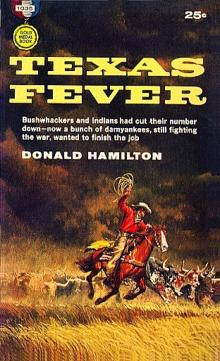 Texas Fever
Texas Fever Ambush at Blanco Canyon
Ambush at Blanco Canyon The Big Country
The Big Country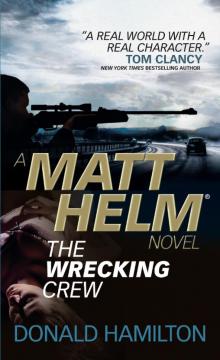 The Wrecking Crew
The Wrecking Crew The Devastators mh-9
The Devastators mh-9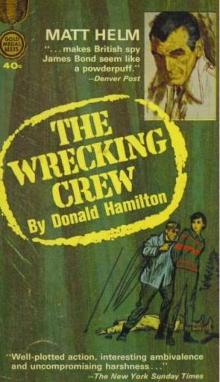 The Wrecking Crew mh-2
The Wrecking Crew mh-2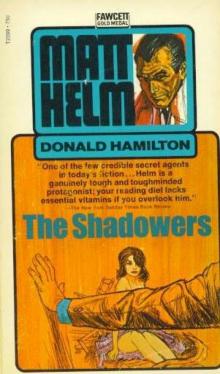 The Shadowers mh-7
The Shadowers mh-7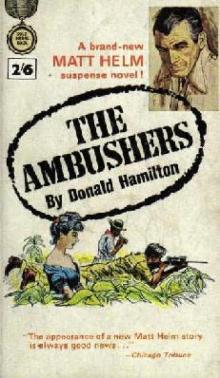 The Ambushers mh-6
The Ambushers mh-6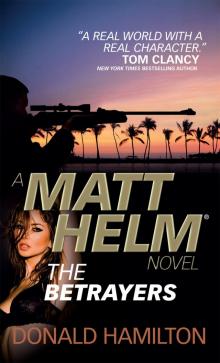 The Betrayers
The Betrayers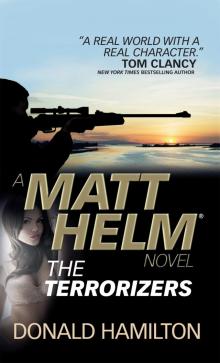 The Terrorizers
The Terrorizers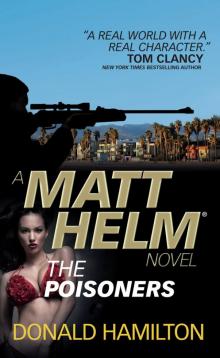 The Poisoners
The Poisoners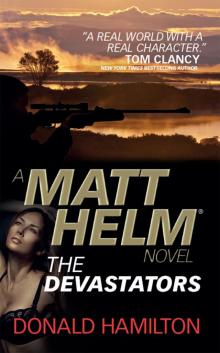 The Devastators
The Devastators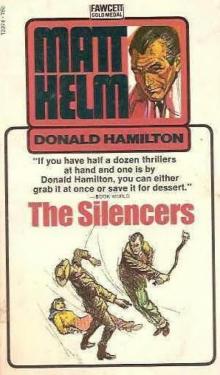 The Silencers mh-5
The Silencers mh-5 The Interlopers mh-12
The Interlopers mh-12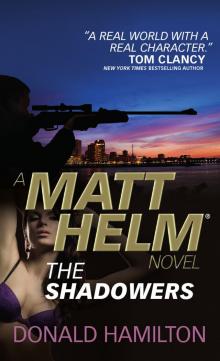 The Shadowers
The Shadowers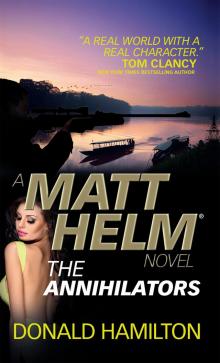 The Annihilators
The Annihilators The Vanishers
The Vanishers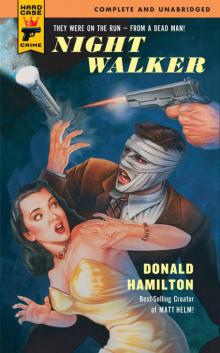 Night Walker
Night Walker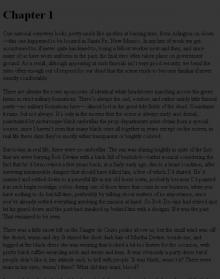 The Revengers
The Revengers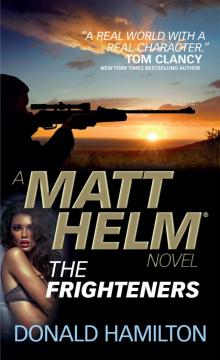 The Frighteners
The Frighteners The Infiltrators
The Infiltrators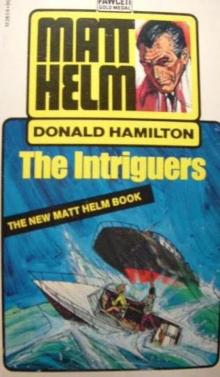 The Intriguers mh-14
The Intriguers mh-14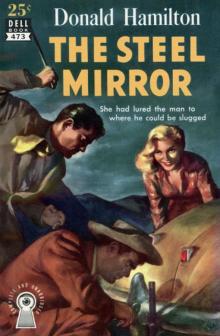 The Steel Mirror
The Steel Mirror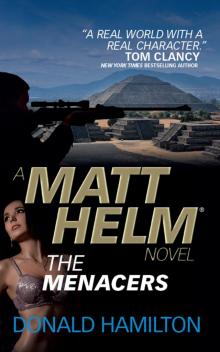 The Menacers
The Menacers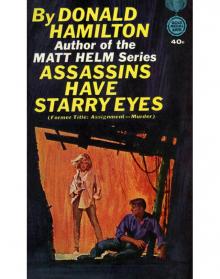 Assassins Have Starry Eyes
Assassins Have Starry Eyes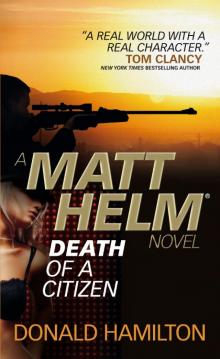 Death of a Citizen
Death of a Citizen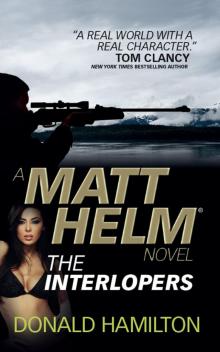 Matt Helm--The Interlopers
Matt Helm--The Interlopers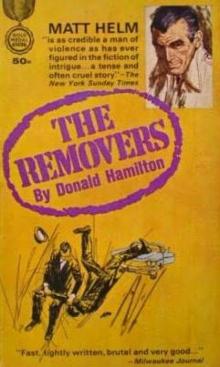 The Removers mh-3
The Removers mh-3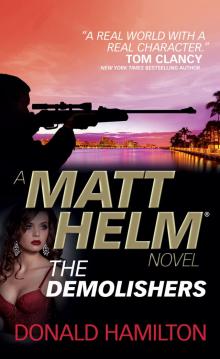 The Demolishers
The Demolishers Murder Twice Told
Murder Twice Told The Poisoners mh-13
The Poisoners mh-13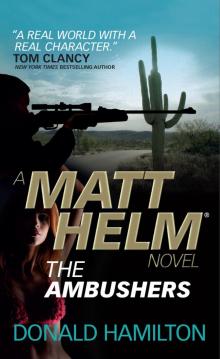 The Ambushers
The Ambushers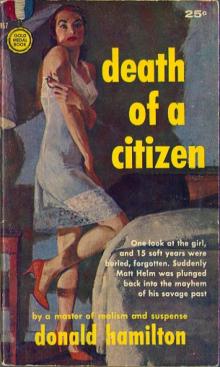 Death of a Citizen mh-1
Death of a Citizen mh-1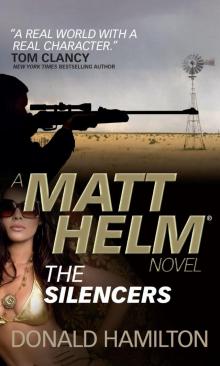 The Silencers
The Silencers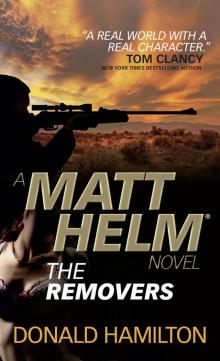 The Removers
The Removers The Intimidators
The Intimidators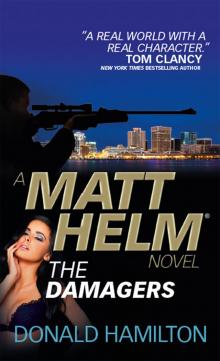 The Damagers
The Damagers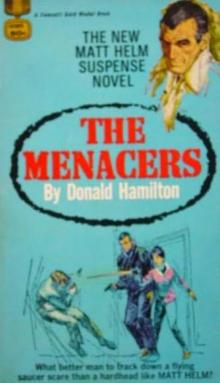 The Menacers mh-11
The Menacers mh-11 The Retaliators
The Retaliators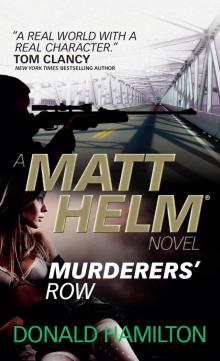 Murderers' Row
Murderers' Row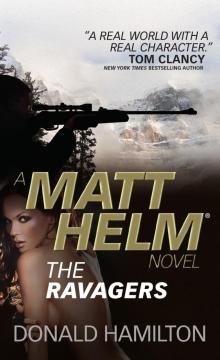 The Ravagers
The Ravagers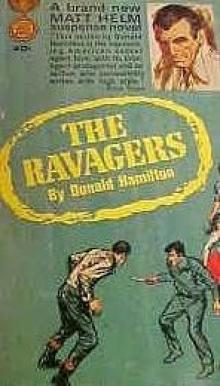 The Ravagers mh-8
The Ravagers mh-8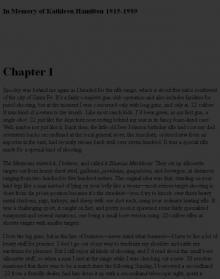 The Threateners
The Threateners The Betrayers mh-10
The Betrayers mh-10